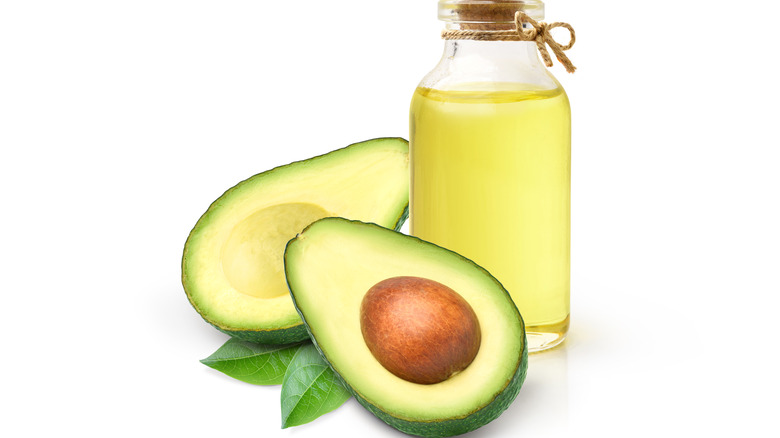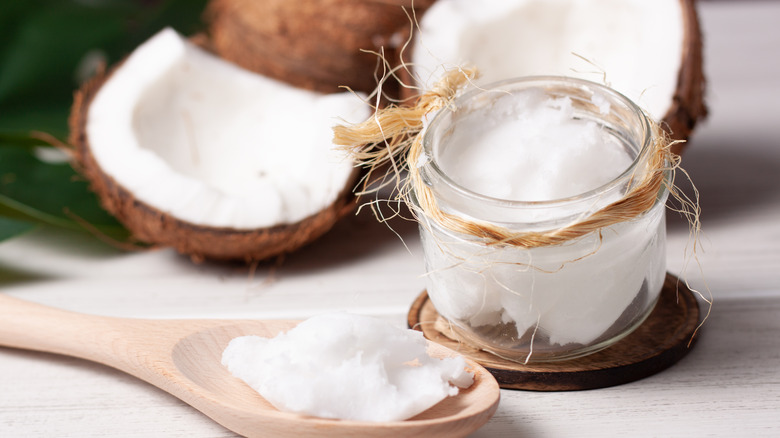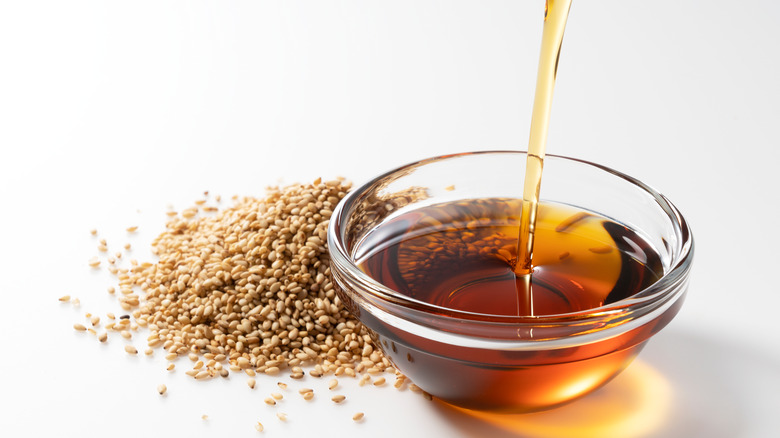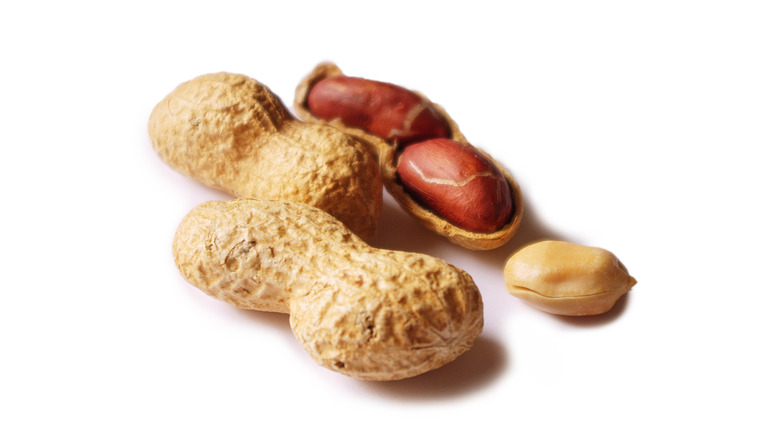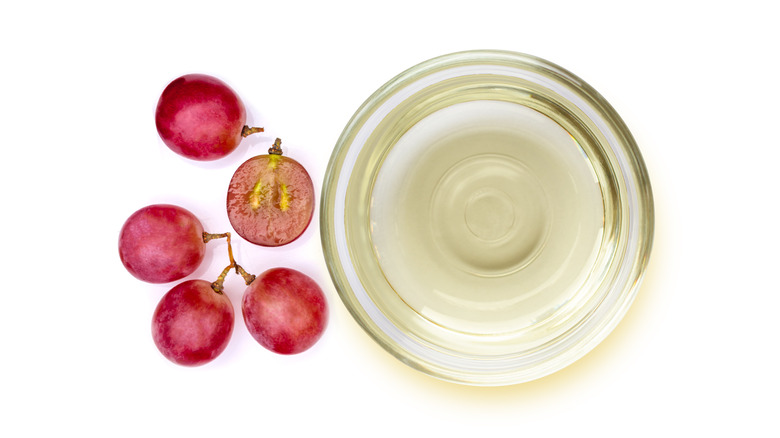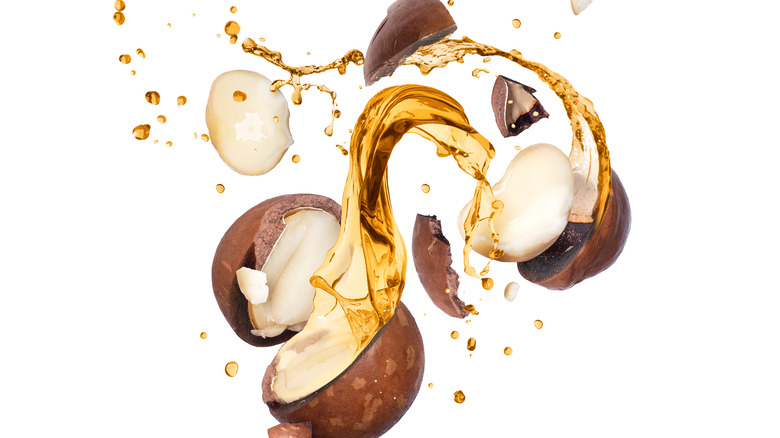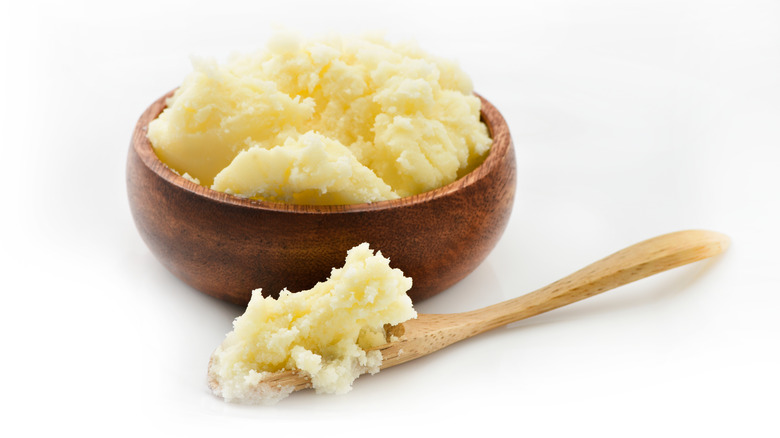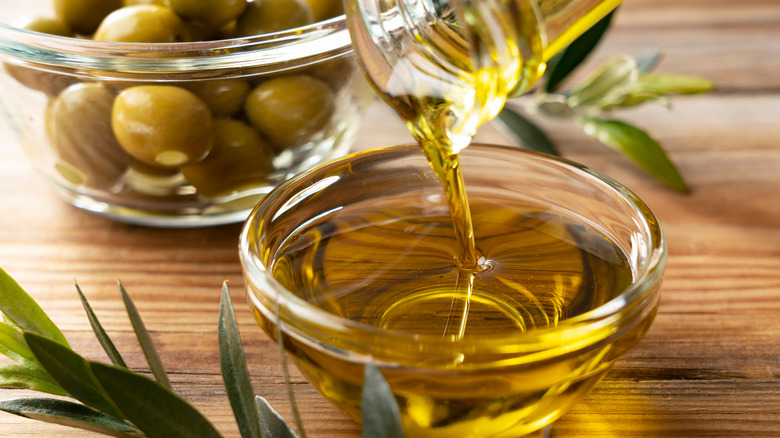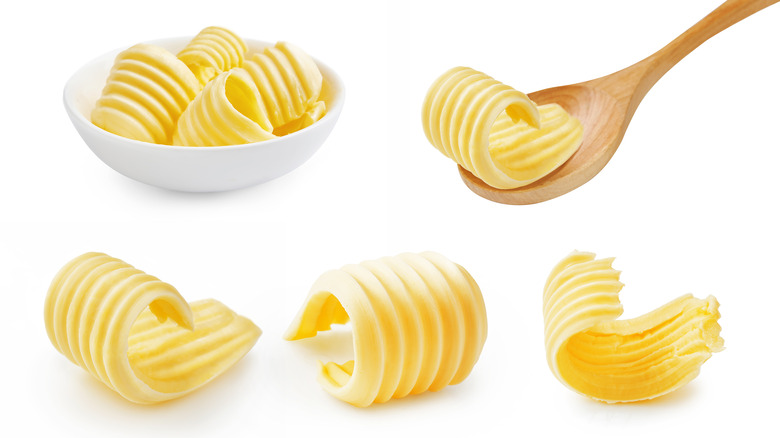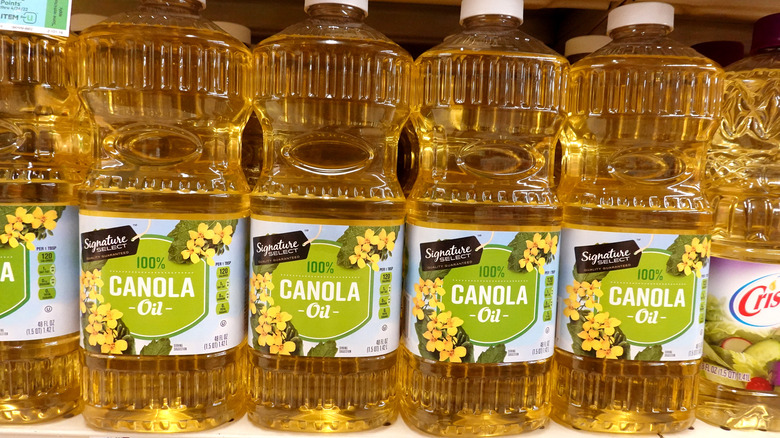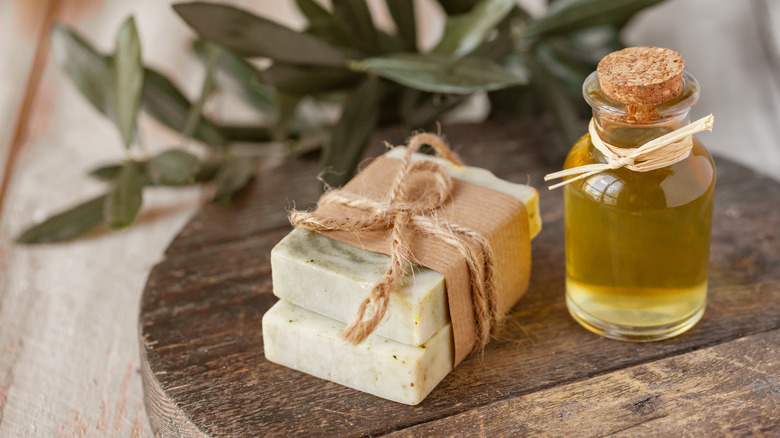The 12 Best Avocado Oil Substitutes
Avocado oil is a pantry staple for all types of chefs and bakers. Primal Kitchen says avocado oil has been touted for several reasons, including flavor, cooking qualities, and health benefits. There are two primary types of avocado oil: refined and unrefined. Refined avocado oil has a nuanced flavor and a higher smoke point than unrefined avocado oil; this means the oil will not produce as many burnt flavor notes when cooked at a higher temperature, according to MasterClass. Unrefined avocado oil has a grassy, buttery flavor and will give off more burnt notes if the cooking temperature exceeds its smoke point of 480 F (via MasterClass).
Avocado oil is also a source of mono-saturated fats, which, according to the National Library of Medicine, help lower LDL cholesterol levels and maintain healthy cell growth. Avocado oil also has less saturated fats than other conventional vegetable oils on the market like extra virgin olive oil, peanut oil, and sunflower oil, notes MasterClass, making it a good option for individuals monitoring their saturated fat intake.
Despite all the benefits of avocado oil in cooking, there are some instances where avocado oil needs to be substituted for another oil. These include allergies, taste, smoke points — or even forgetting to pick up a bottle on your last grocery store trip. A 1-to-1 substitution ratio should be used when substituting avocado oil for another oil to maintain the same moisture in a recipe. Here are some easy swaps for avocado oil in your kitchen!
Coconut oil
Coconut oil is a rich source of mono-saturated fats and has a relatively mild undertone. There are two primary types of coconut oil: refined and unrefined coconut oil. Unrefined (also called virgin) coconut oil has a more pungent aroma and coconut flavor along with a significantly longer shelf life. Refined coconut oil has a significantly higher smoke point than its unrefined counterpart. Both refined and unrefined coconut oil are at a solid state below 76 F but can be easily melted into an oil; this makes coconut oil a superior choice for baking instead of avocado oil.
The IV Greenhouse's avocado oil brownie recipe is one where coconut oil could act as a seamless replacement for avocado oil. For this recipe, you'll want to melt unrefined coconut oil into a liquid form. To do this, add unrefined coconut oil to a microwave-safe dish and heat in the microwave until soft. Stir frequently to prevent the coconut oil from burning. Substitute it at a 1-to-1 ratio into the brownie batter.
Sesame oil
Sesame oil comes in two varieties: raw and toasted. According to Martha Stewart, raw sesame oil is a good choice for shallow frying or roasting because it has a high smoke point. Try substituting avocado oil for sesame oil in a crockpot or stir fry recipe. On the other hand, toasted sesame oil has a more bitter flavor; heating or frying in this oil will only heighten its bitter notes. Therefore, toasted sesame oil should only be used as a garnish or as a flavor in fresh salads in place of avocado oil, such as Paul C. Reilly's cold soba noodle salad with shrimp, mango, and tomato.
Sesame oil does have some drawbacks. It has a very distinct flavor that makes it overpowering in dishes — especially baked goods. Do not use sesame oil as a substitute in a cake or bread recipe; stick to a neutral oil (like corn or vegetable oil) for those types of recipes.
Peanut oil
Like avocado oil, peanut oil has a somewhat nutty undertone and high smoke point. Peanut oil can be used in many applications including frying, dressings, sauces, and marinades. Instead of vegetable oil or avocado oil, try using peanut oil to sauté vegetables for a spicy curry; the peanut oil will accentuate the cumin, turmeric, and chili powder. Peanut oil cannot be substituted for avocado oil in all recipes, though, due to its pungent odor and flavor.
One frying recipe that you have to try substituting peanut oil for avocado oil is Rachel Mansfield's crispy chicken tenders. The use of almond flour, garlic powder, and paprika would all pair well with a peanut oil substitute. For a stronger peanut flavor experience, try whipping up a spicy peanut sauce with chili oil, peanut butter, red pepper flakes, and hoisin sauce. Dip your chicken in the spicy peanut sauce for a quick appetizer or innovative take on a chicken satay!
Grapeseed oil
Grapeseed oil is known for its mild taste and numerous nutritional qualities of high vitamin E and high linoleic acid, according to Healthline. Martha Stewart notes that grapeseed oil is neutral in taste, unlike other oils that have floral or nutty notes. This makes grapeseed oil a good substitution for avocado oil in vinaigrettes, baking, or stir-fries. Use grapeseed oil to make homemade mayonnaise with egg yolks, grapeseed oil, and extra virgin olive oil. Grapeseed oil could also be a great substitute for avocado oil in a vegan taco salad; the neutral flavor of the oil would not disrupt the spices or seasonings used in the recipe.
For a sweet way to use grapeseed oil, consider goji-poppy bran muffins made with fresh goji berries, poppy seeds, wheat bran, and wheat flours. The grapeseed oil and non-fat Greek yogurt in this recipe are vital in creating a moist muffin that is a delectable addition to any breakfast.
Macadamia nut oil
Macadamia nut oil is made from pressed macadamia nuts. Unlike other nut and seed oils, macadamia nut oil has a significantly longer shelf-life and does not go rancid as quickly, according to Kitchen Instincts. It is a liquid at room temperature, unlike ghee or coconut oil. It has one of the higher smoke points of the oils on this list at 410 F, so it is a decent substitute in high-heat dishes like stir fries and pan-searing.
Macadamia is an all-purpose oil that can be used in place of canola oil or generic vegetable oil. Use macadamia oil in place of vegetable oil in a French toast recipe; mixing the oil with the butter to fry French toast can limit the burnt notes if the French toast cooks too long in the pan. Not to mention, chopped macadamia nuts are a fatty and crunchy addition atop any French toast recipe!
Vegetable oil
Vegetable oil is a combination of plant-based oils made from plants and seeds. It typically contains a mix of neutral-flavored oils like sunflower oil, coconut oil, soybean oil, and avocado oil. The resulting oil is relatively flavorless and has a smoke point of around 450 F, per Southern Living.
According to Cooks Illustrated, vegetable oil's neutral flavor makes it an ideal swap for avocado oil in baking and cooking. Vegetable oil is one of the cheapest plant-based oils on the market. This means that vegetable oil is especially valuable for recipes that require a lot of oil, like doughnuts. Mix vegetable oil and sesame oil in fried rice to minimize overpowering the taste of the sesame oil in the recipe while still having enough oil to fry the vegetables, protein, and rice.
Substitute vegetable oil for crispy french fries in your air fryer. You can choose to season your fries with dried herbs or smoked salt after they are crisped up and ready to eat.
Ghee (clarified butter)
Ghee is a clarified butter product that has become more widely used in recent years. It is produced by simmering butter down and removing its water and milk proteins. The result is a subtle nutty flavor with a buttery consistency. Ghee can be purchased in most conventional grocery stores, or it can be made at home by straining cooked butter through a cheesecloth to remove the milk proteins, then reheating it to turn the milk solids brown. The clarified butter can be stored in the refrigerator for a few months.
Ghee has a higher smoke point than traditional butter, so it can be used in more high-heat recipes than butter. The New Ayurvedic Kitchen recommends using ghee to fry spices to make them more aromatic, or to cook eggs with them for a more flavorful taste than other oils.
There is a lot of potential for substituting ghee for avocado oil in recipes. Although Miriam Hahn's recipe for flaky scallion pancakes calls for avocado oil, adding ghee instead would provide a delicious buttery taste. You'll just want to melt the ghee down in a microwave-safe container or saucer before using it for this recipe.
Extra virgin olive oil
Extra virgin olive oil is manufactured by grinding olives into a paste before pressing them into oil. The lack of heat during the process (called "cold-pressing) preserves extra virgin olive oil's fruity aroma and organic taste, according to OliveOil. These flavors in turn make extra virgin olive oil an excellent companion to fresh salads, Caprese, and pasta.
Refined avocado oil has a smoke point of 520 F compared to olive oil's measly smoke point of around 350 degrees. Therefore, extra virgin olive oil is not a good substitute for avocado oil when frying. Plus, why would anyone want to muddle the beautiful floral flavor of a well-made extra virgin olive oil?
Extra virgin olive oil is the star of a Caprese salad with tomato vinaigrette. Its flavor notes complement the fresh garden flavors of heirloom tomatoes, mint, chives, and basil — as well as the fattiness of burrata cheese balls. This is one recipe where you would want to substitute avocado oil for extra virgin olive oil. Jordan Toft's avocado toast recipe, made with a deconstructed egg gribiche (soft-boiled egg, capers, Dijon, and cornichons) is another recipe where extra virgin olive oil shines. The earthy flavors of the avocado combined with the citrus notes of the lemon juice pair well with the fattiness of the soft-boiled egg and the extra virgin olive oil drizzle.
Butter
Butter is a highly saturated fat –- meaning that it stays solid at room temperature. This is a key difference from avocado oil, which is a liquid at room temperature. The state of the fat is important in the density and texture of the food; this is especially relevant when working with pastries and baking. Butter and avocado oil can be substituted 1-to-1 in recipes where using butter does not detrimentally contribute to the texture of a recipe, per H-E-B. And, The Huffington Post suggests substituting melted butter for oil to achieve a firm, dense boxed cake-mix cake.
Butter can be substituted for avocado oil in recipes beyond baking, though. Lord Byron's Kitchen recommends sautéing cremini mushrooms, thinly sliced shallots, and butter for a rustic and savory side dish. The brown butter amplifies the umami flavors in the mushrooms in a way that avocado oil could never — especially when combined with the saltiness of Worcestershire sauce.
Canola oil
Canola oil is a widely available oil in most grocery stores. Canola oil is extracted from the Brassicaceae plant family and is lower in trans fats and saturated fats than other oil options. According to Registered Dietitian Meghan Merideth Trebotich, both vegetable oil and canola oil have the same light, neutral taste (via Insider). This makes canola oil an indistinguishable swap for vegetable oil in most recipes.
Canola oil, like vegetable oil, would be best substituted for avocado oil in baked dishes like Paleo Hacks' orange and avocado oil cake. Using canola oil will still provide the moisture and fats needed to make a great cake with a crumbly structure. Although the taste of the cake may be slightly more nuanced, the flavor from the cocoa and the orange will mask significant changes in the flavor profile. Avoid replacing avocado oil with canola oil for fresh drizzles, like bruschetta and bread-dipping, because canola oil lacks the same earthy taste as avocado oil.
Sunflower oil
Sunflower oil has a slightly nutty undertone which would make it a good substitute for avocado oil in dressings and marinades. Use sunflower oil to make Joy Filled Eats' grilled chicken marinade; the flavors will complement the garlic and lemon flavor without overpowering the other ingredients. Its smoke point is around 450 F, which means you won't have to expect burnt notes when you grill the chicken.
Its relatively inexpensive price makes sunflower oil a good substitute for avocado oil in frying or baking as well. According to FoodsGuy, sunflower oil remains stable in the heat for long periods, making sunflower oil a good oil for deep-frying turkey. The neutral taste of the sunflower oil will also not disrupt the flavor of the turkey.
Cooking with sunflower oil may have some positive health implications. Sunflower oil contains slightly more polyunsaturated fats and monounsaturated fats than other oil substitutes.
Pure olive oil
According to DeLallo, pure olive oil has a more neutral flavor than extra virgin olive oil but still has a stronger olive flavor than light olive oil. Olive oil can be used as a 1-to-1 substitute for avocado oil; it even contains more calcium, potassium, iron, and vitamins than avocado oil, Brightland adds. Both avocado and olive oil have an organic flavor, which makes these ingredients great substitutes for one another.
Pure olive oil has a slightly higher smoke point than extra virgin olive oil, making it a stable oil for grilling and high-heat cooking. Additionally, the organic flavor of pure olive oil makes it a great substitute for avocado oil when grilling fresh vegetables. This Mexican street corn salad from Southern Kissed would benefit from the flavor undertone of pure olive oil when avocado oil isn't around. The salad is made from frozen corn, Tajín, cojita cheese, garlic, onions, and fresh lime juice — it's a great companion for any taco and margarita night!
